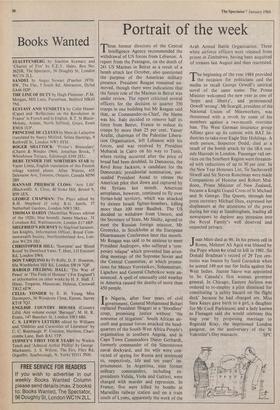Portrait of the week
Three former directors of the Central 1 Intelligence Agency recommended the withdrawal of US forces from Lebanon. A report from the Pentagon, on the death of 241 US Marines in Beirut as a result of a bomb attack last October, also questioned the purpose of the American military presence. President Reagan remained un- moved, though there were indications that the future role of the Marines in Beirut was under review. The report criticised several officers for the decision to quarter 350 troops in one building but Mr Reagan said that, as Commander-in-Chief, the blame was his. Italy decided to remove half its force from Beirut, France to reduce its troops by more than 25 per cent. Yasser Arafat, chairman of the Palestine Libera- tion Organisation, left Lebanon with his forces, and was received by President Mubarak in Cairo on his way to Tunis, where rioting occurred after the price of bread had been doubled. In Damascus, the Revd Jesse Jackson, a candidate for the Democratic presidential nomination, per- suaded President Assad to release the American pilot shot down and captured by the Syrians last month. American aeroplanes, however, continued to fly over Syrian-held territory, which was attacked by sixteen Israeli fighter-bombers, killing more than 100 near Baalbek. The US decided to withdraw from Unesco, and the Secretary of State, Mr Shultz, agreed to meet the Russian foreign minister, Mr Gromyko, in Stockholm at the European Disarmament Conference later this month. Mr Reagan was said to be anxious to meet President Andropov, who suffered a 'tem- porary relapse' which prevented him atten- ding meetings of the Supreme Soviet and the Central Committee, at which promo- tions for Messrs Vorotnikov, Solomentsev, Ligachov and General Chebrikov were an- nounced. A spell of unusually cold weather in America caused the deaths of more than 450 people.
In Nigeria, after four years of civil government, General Mohammed Buhari replaced President Shagari in a 'bloodless' coup, promising justice without 'the nonsense of litigation'. South African air- craft and ground forces attacked the head- quarters of the South-West Africa People's organisation in southern Angola, and in Cape Town Commodore Dieter Gerhardt, formerly commander of the Simonstown naval dockyard, and his wife were con- victed of spying for Russia and sentenced to, respectively, life and ten years' im- prisonment. In Argentina, nine former military commanders, including ex- presidents Videla, Viola and Galtieri, were charged with murder and repression. In France, five were killed by bombs at Marseilles railway station and on a train south of Lyons, apparently the work of the Arab Armed Battle Organisation. Three white airforce officers were released from prison in Zimbabwe, having been acquitted of treason last August and then rearrested.
The beginning of the year 1984 provided the occasion for politicians and the media to recall George Orwell's satirical novel of the same name. The Prime Minister welcomed the new year as one of 'hope and liberty', and pronounced Orwell 'wrong'. Mr Scargill, president of the National Union of Mineworkers, was threatened with a revolt by some of his members against a two-month overtime ban. The West German insurance group Allianz gave up its contest with BAT In- dustries to take over Eagle Star Holdings. A sixth person, Inspector Dodd, died as a result of the bomb attack by the IRA out- side Harrods in London. Passenger rail ser- vices on the Southern Region were threaten- ed with reductions of up to 30 per cent. In the New Year Honours List, Sir Sacheverell Sitwell and Sir Steven Runciman were made Companions of Honour and Robert Mul- doon, Prime Minister of New Zealand, became a Knight Grand Cross of St Michael and St George. The Queen, through her press secretary Michael Shea, expressed her displeasure at the attentions of the press during her stay at Sandringham, leading all newspapers to deplore any intrusion into the Royal Family's well deserved and respected privacy.
Joan Miro died at 90. In his prison cell in Rome, Mehmet Ali Agca was blessed by the Pope whom be tried to kill in 1981. Sir Donald Bradman's record of 29 Test cen- turies was beaten by Sunil Gavaskar when he scored 149 not out for India against the West Indies. Jeanne Sauve was appointed to be Canada's first woman governor general. In Chicago, Eastern Airlines was ordered to re-employ a pilot dismissed for constituting 'a safety hazard on the flight deck' because he had changed sex. Miss Sara Keays gave birth to a girl, a daughter for Mr Cecil Parkinson; and a lady known as Flanagan said she would celebrate this leap year by proposing marriage to Reginald Kray, the imprisoned London gangster, on the anniversary of the St
Valentine's Day massacre. SPC


































 Previous page
Previous page